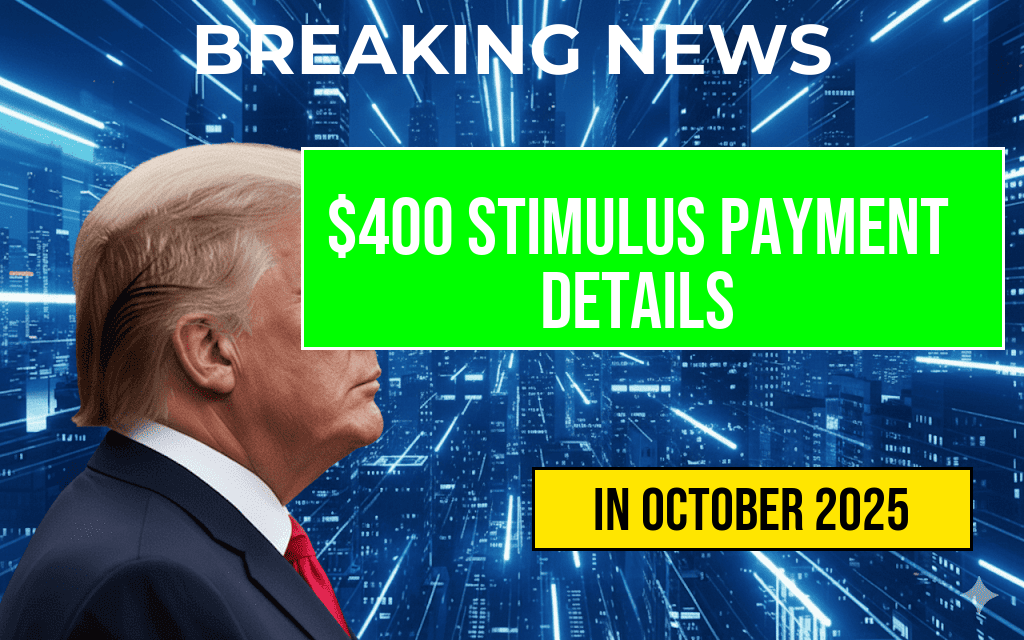The federal government has announced a new $400 stimulus payment program aimed at providing financial relief to eligible Americans amid ongoing economic challenges. This initiative, designed to support households across the country, is accessible to a broad segment of the population, with specific eligibility criteria and a structured payment schedule. Eligible individuals can expect to receive their payments via direct deposit or check, with funds distributed over multiple waves starting as early as next month. This article details the key eligibility requirements, the complete payment schedule, and important steps for recipients to ensure they receive their relief funds promptly.
Overview of the $400 Stimulus Payment Program
The stimulus plan, approved by Congress and signed into law by the President, allocates a total of $1.2 billion to support individual households through direct payments. The $400 stimulus is designed to assist those impacted by recent economic disruptions, including inflation, rising living costs, and pandemic-related challenges. Unlike previous aid packages, this program emphasizes broad eligibility, aiming to reach both low- and middle-income Americans. The payments are intended to help cover essentials such as housing costs, utilities, and groceries, providing a vital financial cushion during uncertain economic times.
Eligibility Criteria for the $400 Stimulus Payment
Basic Requirements
- Residency: Must be a legal resident of the United States, including U.S. citizens and qualifying non-citizens.
- Income Threshold: The program targets individuals and households with an annual income below $75,000 for single filers and $150,000 for joint filers.
- Tax Filing Status: Taxpayers who filed their 2022 tax returns or have registered for the Earned Income Tax Credit (EITC) are automatically eligible.
- Age: Applicants must be at least 18 years old, with certain exceptions for dependents and minors in specific cases.
Additional Criteria
- Social Security Number: Valid SSN is required for all eligible individuals.
- Income Verification: Income is verified through IRS records; no additional documentation is typically necessary unless discrepancies arise.
- Previous Benefits: Those who received stimulus payments in prior rounds are generally eligible for this new payment, provided they meet current income and residency criteria.
Payment Schedule and Distribution Process
| Payment Wave | Estimated Distribution Dates | Eligible Recipients |
|---|---|---|
| Wave 1 | Starting August 15, 2024 | Direct deposit for filers and recipients with updated banking info |
| Wave 2 | August 29, 2024 | Checks mailed to those without direct deposit info on file |
| Wave 3 | September 12, 2024 | Supplementary payments and corrections for eligible recipients |
Recipients are encouraged to verify their banking information with the IRS or appropriate state agencies to ensure timely receipt. The IRS has established a dedicated portal, irs.gov, where individuals can check the status of their payment and update their details if necessary. Payments will be automatically processed for those who have already filed their 2022 taxes and are registered with the IRS for direct deposit.
Steps to Ensure Eligibility and Secure Payment
Verify Your Income and Filing Status
Check your most recent tax return or IRS account for confirmation of your income level and filing status. If you haven’t filed for 2022, consider submitting a return promptly to qualify for the stimulus payment.
Update Banking Information
Ensure your banking details are current with the IRS to receive direct deposits efficiently. This can be done through the IRS online portal or by contacting your tax preparer.
Watch for Official Communications
The IRS will send notifications regarding payment status via email or postal mail. Be cautious of phishing scams and only trust communications from official government sources.
Additional Support and Resources
For further information on eligibility, the application process, and frequently asked questions, visit the official IRS website or consult local government resources. The IRS also provides a helpful FAQs page that offers insights into the stimulus program specifics.
As the distribution begins, officials emphasize the importance of accurate information submission and timely updates to avoid delays. This $400 stimulus payment aims to provide critical financial relief to millions of Americans navigating economic uncertainties, ensuring support reaches those who need it most during these challenging times.
Frequently Asked Questions
Question
Who is eligible to receive the $400 stimulus payment?
Answer
Individuals who meet the eligibility criteria outlined in the article, including residency status, income level, and tax filing requirements, are eligible to receive the $400 stimulus payment.
Question
What are the key eligibility criteria for receiving the stimulus payment?
Answer
The main eligibility criteria include being a resident of the eligible region, having a valid income within specified limits, and filing taxes for the relevant year.
Question
When is the complete payment schedule for the $400 stimulus payment?
Answer
The payment schedule is outlined in the article, with payments expected to be disbursed in specific months, starting from the initial distribution date and continuing according to the announced timetable.
Question
How can recipients check the status of their stimulus payment?
Answer
Recipients can check the status of their payment through the official government portal or designated online tools, using their personal information and payment details for verification.
Question
Are there any additional requirements or documentation needed to receive the payment?
Answer
Generally, additional documentation is not required if you meet the eligibility criteria, but some individuals may need to verify their identity or income details through specific forms or documentation.

Leave a Reply